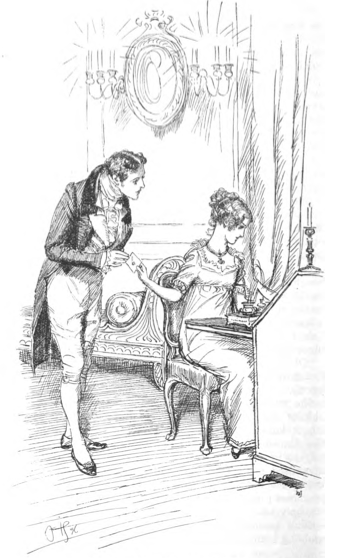Pop quiz: One of the following quotations describes Mr. Rushworth of Mansfield Park, and the other describes Mr. Collins of Pride and Prejudice. Which is which?
a: “He was a tall, heavy-looking young man of five-and-twenty.”
b: “He was a heavy young man, with not more than common sense”
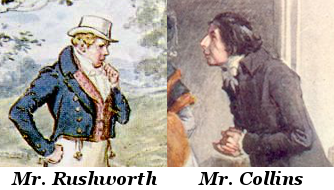
Jane Austen obviously considered affection an important requirement for marriage. Not all of her characters share their creator’s values, however. Maria Bertram of Mansfield Park marries Mr. Rushworth, a man for whom she entertains no warmer sentiment than contempt, and Charlotte Lucas of Price and Prejudice marries Mr. Collins, whose society she finds irksome. Maria and Charlotte thought alike in several ways, though with some important differences and from dissimilar backgrounds. So, without further ado, Maria Bertram versus Charlotte Lucas:
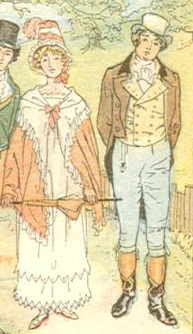 “Being now in her twenty-first year, Maria Bertram was beginning to think matrimony a duty; and as a marriage with Mr. Rushworth would give her the enjoyment of a larger income than her father’s, as well as ensure her the house in town, which was now a prime object, it became, by the same rule of moral obligation, her evident duty to marry Mr. Rushworth if she could.” (MP, Ch. 4)
“Being now in her twenty-first year, Maria Bertram was beginning to think matrimony a duty; and as a marriage with Mr. Rushworth would give her the enjoyment of a larger income than her father’s, as well as ensure her the house in town, which was now a prime object, it became, by the same rule of moral obligation, her evident duty to marry Mr. Rushworth if she could.” (MP, Ch. 4)
“Without thinking highly either of men or matrimony, marriage had always been her [Charlotte Lucas’s] object; it was the only provision for well-educated young women of small fortune, and however uncertain of giving happiness, must be their pleasantest preservative from want. This preservative she had now obtained; and at the age of twenty-seven, without having ever been handsome, she felt all the good luck of it.” (P&P, Ch. 22)
“Mr. Rushworth was from the first struck with the beauty of Miss Bertram, and, being inclined to marry, soon fancied himself in love. He was a heavy young man, with not more than common sense; but as there was nothing disagreeable in his figure or address, the young lady was well pleased with her conquest.” (MP, Ch. 4)
“Charlotte herself was tolerably composed. She had gained her point, and had time to consider of it. Her reflections were in general satisfactory. Mr. Collins, to be sure, was neither sensible nor agreeable; his society was irksome, and his attachment to her must be imaginary. But still he would be her husband.” (P&P, Ch. 22)
“In all the important preparations of the mind she [Maria] was complete: being prepared for matrimony by an hatred of home, restraint, and tranquillity; … and contempt of the man she was to marry.” (MP, Ch. 21)
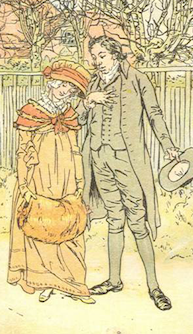 “The whole [Lucas] family … were properly overjoyed on the occasion. The younger girls formed hopes of coming out a year or two sooner than they might otherwise have done; and the boys were relieved from their apprehension of Charlotte’s dying an old maid. …
“The whole [Lucas] family … were properly overjoyed on the occasion. The younger girls formed hopes of coming out a year or two sooner than they might otherwise have done; and the boys were relieved from their apprehension of Charlotte’s dying an old maid. …
“‘[W]hen you have had time to think it over, I hope you will be satisfied with what I [Charlotte] have done. I am not romantic, you know; I never was. I ask only a comfortable home; and considering Mr. Collins’s character, connection, and situation in life, I am convinced that my chance of happiness with him is as fair as most people can boast on entering the marriage state.’” (P&P, Ch. 22)
And were Maria and Charlotte happy? When Elizabeth Bennet goes to visit her friend Charlotte, she observes, “When Mr. Collins said anything of which his wife might reasonably be ashamed, which certainly was not unseldom, … in general Charlotte wisely did not hear. … When Mr. Collins could be forgotten, there was really an air of great comfort throughout [the house], and by Charlotte’s evident enjoyment of it, Elizabeth supposed he must be often forgotten.” (P&P, ch. 28). While few, I suppose, would wish to obtain enjoyment and comfort only by forgetting their husbands, Maria fairs even worse. She runs away with another man. “She hoped to marry him, and they continued together till she was obliged to be convinced that such hope was vain, and till the disappointment and wretchedness arising from the conviction rendered her temper so bad, and her feelings for him so like hatred, as to make them for a while each other’s punishment, and then induce a voluntary separation.” (MP, ch. 48). Moral of the story: Don’t marry someone you don’t love.
Oh, and if you didn’t find the answers to the pop quiz in the quotations above, “a” is Mr. William Collins (see P&P, Ch. 13) and “b” is Mr. James Rushworth (see MP, Ch. 4).
________________________
Illustrations: Mr. Rushworth and Mr. Collins by C. E. Brock (top), Maria Bertram and Mr. Rushworth by H. M. Brock (center), Charlotte Lucas and Mr. Collins by H. M. Brock (bottom).
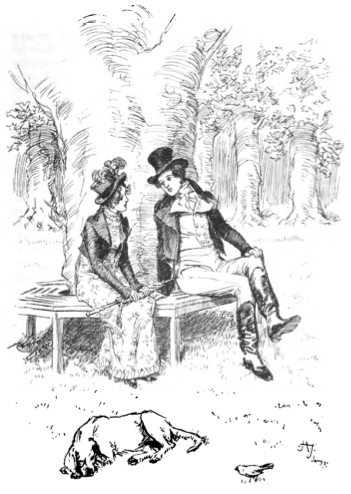 Beyond this, their marriage could strengthen both Edmund and Fanny individually. Because Fanny fully supported Edmund’s career, Edmund could gain confidence in his work. As Fanny was not accustomed to expensive gaieties and luxuries she would not weigh him down with discontent.
Beyond this, their marriage could strengthen both Edmund and Fanny individually. Because Fanny fully supported Edmund’s career, Edmund could gain confidence in his work. As Fanny was not accustomed to expensive gaieties and luxuries she would not weigh him down with discontent.